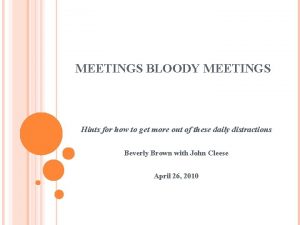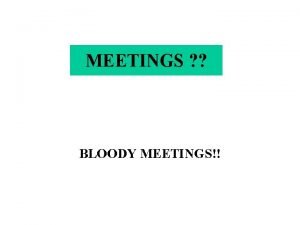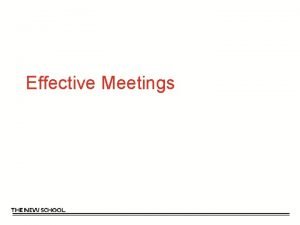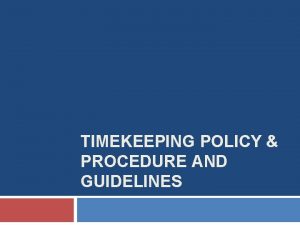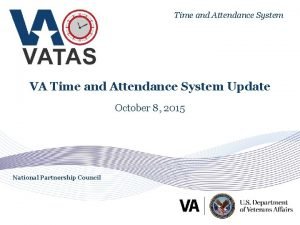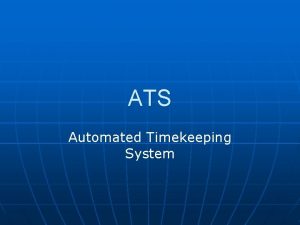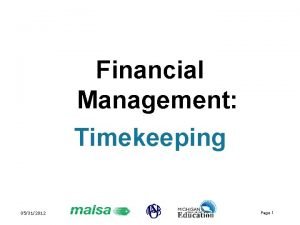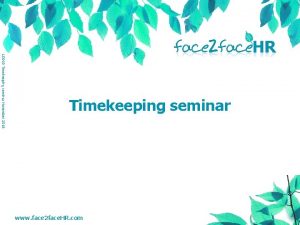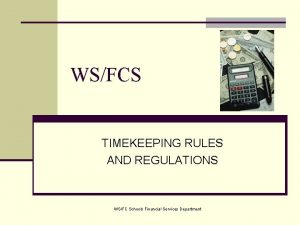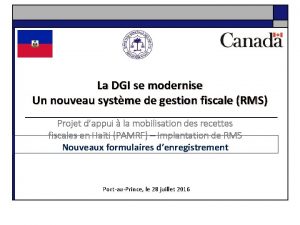Modernise your meetings Mal Harrison Meeting Rules Timekeeping















- Slides: 15

Modernise your meetings Mal Harrison


Meeting Rules Timekeeping Smoking Eating and/or drinking Switching off mobile phones Equal opportunities Recognising and respecting others’ views / contributions • Listening (you may learn something) • Accepting differences in people’s ability to communicate • • Using clear, simple language • Not interrupting • Respecting others’ privacy and personal space • Confidentiality • Unacceptable language • Not holding private discussions between individuals • Directing all contributions “through the Chair”



Behaviours and values • Openness and Honesty (It is a shared responsibility to ensure that all members feel safe to express their opinions • Participation and Equality (Everyone’s contribution is to be recognised and valued • Open to Challenge (Any group member may be challenged in order for the group to learn and change • Fairness: The group must ensure that everyone involved has an equal voice • • Accountability: All members share responsibility for • decisions taken by the group

Meeting Assessment Checklist • Think about a meeting you attended recently • Circle or No

Skills and Qualities • Planning & organisation • Team working/ team building • Leadership • Objectivity • Prioritising • Assertiveness/being firm but sensitive • Public speaking • Active listening • Questioning/Clarifying /Summarising • Problem solving • Decision making • Negotiation • Defusing difficult situations

Understanding Behaviours

Non-Verbal Communication • Facial expressions – e. g. Yawning = boredom? Frowning = displeasure? • Body postures – e. g. Folded arms = defensiveness? Leaning forward = interest? • Gestures – e. g. Finger pointing = aggression? Outstretched hands = willing to compromise? • Mannerisms – e. g. Tapping fingers or pens = impatience? Fiddling = nervousness?

We all have bad habits. .

The Human Zoo explores the foibles, quirks and behaviour of that most fascinating of species – us!!! Who is in your zoo?

We all have bad habits • Have there been times when we take on some of the characteristic of animals? • Rabbit – runs away as soon as they sense any difficulty or jump to another topic • Elephants – block the path to achieving anything • Monkeys – fool around and chatter a lot • Frogs – croak on an on about the same subject • Chameleons change colour depending on who they are with

Evaluation forms, please.

I hope to see you all again, very soon. Thank you Never doubt that a small group of thoughtful, committed citizens can change the world; indeed, it's the only thing that ever has. Margaret Mead
 Mal mal mal blessed
Mal mal mal blessed More bloody meetings
More bloody meetings Meetings, bloody meetings
Meetings, bloody meetings Meetings bloody meetings 5 points
Meetings bloody meetings 5 points Harrison bergeron theme
Harrison bergeron theme Frases de los libros sapienciales
Frases de los libros sapienciales Ground rules for meetings
Ground rules for meetings Rules for effective meetings
Rules for effective meetings Timekeeping policy examples
Timekeeping policy examples Electronic timekeeping
Electronic timekeeping Vatas va
Vatas va Amta timekeeping
Amta timekeeping Automated timekeeping system
Automated timekeeping system Workday timekeeping system
Workday timekeeping system Amta timekeeping
Amta timekeeping Timekeeping ucsb
Timekeeping ucsb

